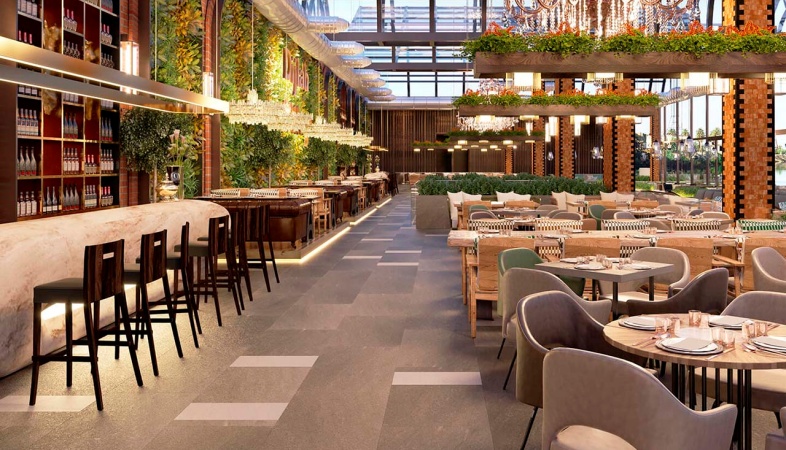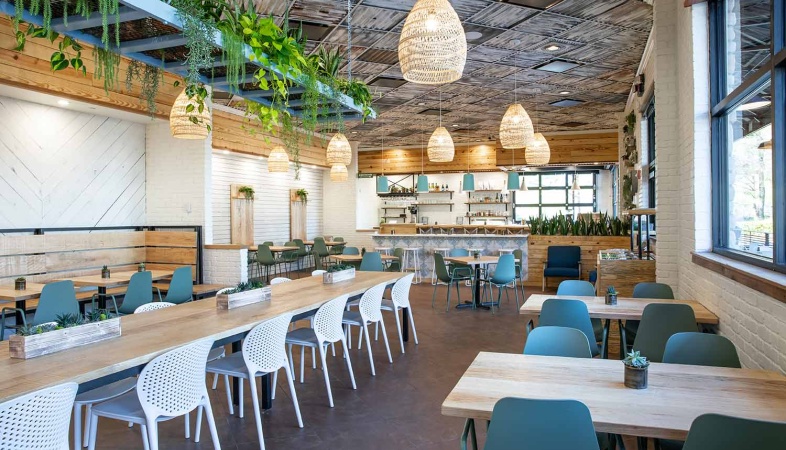Elevating Hospitality: The Impact of Furniture in Hotels and Restaurants
Furniture serves as a tangible representation of a hotel or restaurant's brand image and identity.

Introduction:
In the dynamic and competitive world of hospitality, the ambiance and aesthetics of hotels and restaurants play a pivotal role in shaping the overall guest experience. Furniture, as a fundamental element of interior design, holds the key to creating inviting spaces that not only reflect the brand identity but also ensure comfort and satisfaction for patrons. In this article, we will explore the significance of furniture in the hospitality industry, shedding light on how it contributes to the success of hotels and restaurants.
Setting the Atmosphere:
The choice of furniture in hotels and restaurants is more than just a functional decision; it is a strategic step towards setting the desired atmosphere. Each piece of furniture, from lobby seating to dining chairs, contributes to the overall ambiance and style of the establishment. For instance, modern and sleek furniture may evoke a contemporary and sophisticated vibe, while rustic or vintage pieces could create a more casual and nostalgic atmosphere.
In upscale hotels, lobby furniture often serves as the first point of contact for guests, offering a glimpse into the establishment's personality. Similarly, in restaurants, the selection of tables and chairs is instrumental in defining the dining experience, influencing how patrons perceive the cuisine and service.
Comfort and Ergonomics:
Comfort is a non-negotiable aspect in the hospitality industry, and furniture plays a crucial role in ensuring guests feel at ease. Hotel rooms equipped with comfortable beds and ergonomic chairs contribute to a positive stay experience. Likewise, restaurants that prioritize comfortable seating encourage patrons to linger, enjoy their meals, and potentially return for future visits.
Ergonomics is a key consideration in furniture selection, especially in the restaurant industry where patrons may spend extended periods dining. Chairs with proper lumbar support and tables at appropriate heights not only enhance the dining experience but also contribute to the overall well-being of guests.
Durability and Maintenance:
The high-traffic nature of hotels and restaurants demands furniture that is not only stylish and comfortable but also durable. The wear and tear from constant use necessitate materials and designs that can withstand the rigors of a bustling hospitality environment. Commercial-grade furniture, crafted with sturdy materials such as metal, hardwood, or high-quality synthetic materials, ensures longevity and minimal maintenance.
In restaurants, where spills and stains are inevitable, choosing furniture with easy-to-clean fabrics and finishes is essential. Similarly, in hotel lobbies and common areas, the furniture should be resilient to frequent use without compromising on aesthetics.
Brand Image and Identity:
Furniture serves as a tangible representation of a hotel or restaurant's brand image and identity. The design, color palette, and overall aesthetic of the furniture contribute to the establishment's unique character. For example, a boutique hotel may opt for custom-designed furniture to convey exclusivity and individuality, while a family-friendly restaurant might choose vibrant and playful furnishings to appeal to a younger audience.
Consistent branding through furniture choices creates a cohesive and memorable experience for guests. It helps establish a visual language that reinforces the brand's identity and sets it apart in a competitive market.
Adaptability to Trends:
The hospitality industry is dynamic, with design trends evolving to meet changing consumer preferences. Furniture that is adaptable to current trends allows hotels and restaurants to stay relevant and attract a diverse range of patrons. For instance, the growing popularity of open-concept spaces has led to a preference for modular and multifunctional furniture that can easily transform to meet different needs.
Additionally, sustainability is a rising trend in both the furniture and hospitality industries. Hotels and restaurants are increasingly opting for eco-friendly furniture options, aligning with the values of environmentally conscious consumers.
Conclusion:
Furniture in hotels and restaurants is far more than mere functional pieces; it is an integral component that shapes the guest experience, influences brand perception, and contributes to the success of an establishment. The careful consideration of ambiance, comfort, durability, brand identity, and adaptability to trends is paramount in selecting the right furniture for the hospitality industry. As hotels and restaurants continue to strive for excellence in guest satisfaction, the role of furniture remains a critical factor in creating memorable and inviting spaces that leave a lasting impression.
.png)



.jpg)




.jpg)



















